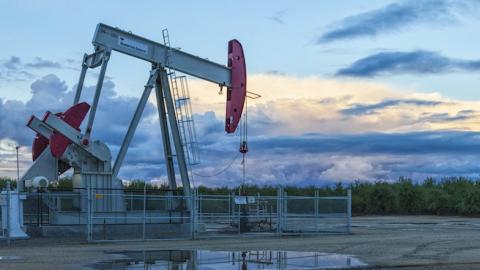Last week was a bad week for Saudi Arabia.
First, Congress overrode Obama’s veto of the bill letting Americans sue the kingdom for its alleged role in the 9/11 attacks. And second, Riyadh finally decided to throw in the towel in its two-year war on American energy producers by announcing that it was prepared to cut oil production by half a million barrels.
That war was supposed to collapse America’s fracking industry. Instead, as reported on OilPrice.com, “Saudi’s entire economy is collapsing” — and they are desperate to push oil prices back up again.
The announcement last week was a complete reversal of the policy the Saudis have been following since the summer of 2014, when, as global oil prices began to tumble, their oil ministry announced that they were going to continue normal production. That flew in the face of the way a major OPEC producer typically reacts to falling prices: Slash production so that demand outstrips supply and prices rise again.
But the Saudis had other ideas. They had watched the fracking boom in the United States with deep unease, as production of shale oil from places like the Bakken field in North Dakota and Eagle Ford in Texas was turning the U.S. into the Saudis’ chief rival as the world’s biggest oil producer (at one point in early 2014 the U.S. even surpassed the Saudis at almost 11 million barrels a day).
The Saudi answer to the American challenge was to keep pumping even as prices fell. The Saudis assumed that a global oil glut would push prices so low that American producers would be forced out of business, production would grind to a halt, and places like the Bakken would soon be as silent and desolate as the surface of the Moon. After all, even if prices fall to five dollars a barrel, the Saudis will still make money, because their production costs are so low. By contrast, in 2014 the average oil-fracking operator was looking at a break-even price of around $60 a barrel. After several months of $40 oil, Riyadh figured, the pain would be too much. Americans would cry uncle, and the Saudis – and the cartel they dominate, OPEC – would once again be kings of the energy hill.
So the kingdom has been pumping and pumping and pumping, at one point this August reaching its highest-ever monthly production, as the price per barrel, after sinking into a trough below $40, settled into a “new normal” in the mid-40s range (compared with over $100 a barrel in June 2014).
Last week someone did finally cry uncle — the Saudis. Far from ruining the U.S. fracking industry, the global oil glut is about to ruin the kingdom of Saudi Arabia. It seems that an economic and social system that has developed around oil — indeed, is entirely dependent on it — couldn’t sustain itself at prices this low.
The government was forced to cut benefits to citizens — the Saudis have built an enormous welfare state on the back of their oil industry. It’s had to make plans to lay off some government workers and reduce the salaries of others, while the country’s budget deficit stands at 13.5 percent of GDP (ours, by contrast, is just 2.5 percent). Today Saudi Arabia is facing an economy that’s barely growing at 1 percent, which makes the Obama economy look like the booming Reagan years.
Even worse, they face an American oil industry that’s grown stronger, not weaker, as a result of the price slide. As prices fell, American producers learned to cut costs and make their industry more efficient, even as companies used debt-for-equity swaps to stay in business. Against all expectation, American output actually continued to rise. Even though more than 100 energy companies have had to go out of business, the lean and strong have survived. The break-even price for American shale producers has been steadily shoved down so that, although it will never reach Saudi levels, it’s possible to make money even at $45 a barrel (today Brent crude is at $50).
What does all this mean for the future?
First, the Saudi surrender means that they not only failed to break the backs of American energy producers, they made them stronger. So strong, in fact, that if the Saudi production cut pushes crude prices back up, American producers will be making more money than ever — money that can be invested in new energy exploration and development and in new technologies like waterless fracking and laser drilling that will make fracking safer, cleaner, and more efficient than ever.
Above all, it means America has truly reemerged as the world’s energy superpower. It’s not at all clear if the Saudi-led decision at the OPEC meeting last week in Algiers to cut production by some 800,000 barrels a day will really push oil prices higher. But either way, the verdict is clear. The Americans have won, and the Saudis have lost, this crucial round of the oil war.


















